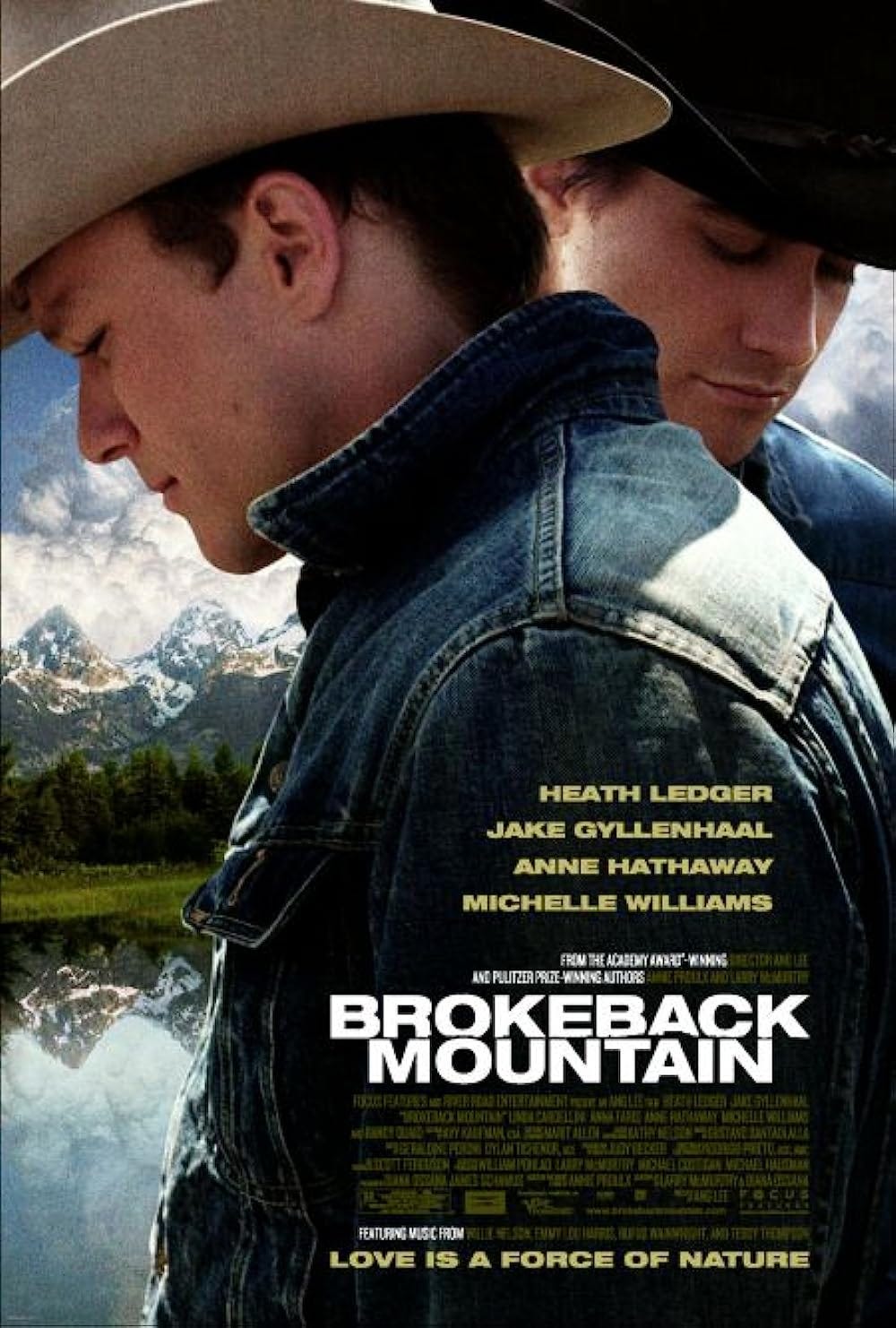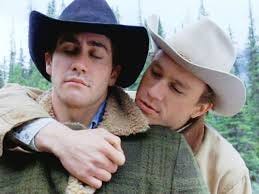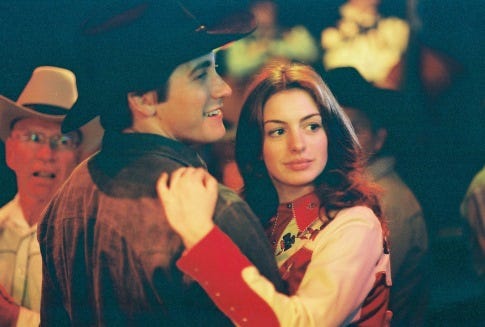Part 16 - Ledger and Gyllenhaal Scale Violently Emotional Heights In 'Brokeback Mountain'
Why was Brokeback Mountain such a powerfully potent piece of cinema?
I feel that I am writing this at a deeply important, yet undeniably tragic moment in history. I want to be careful when discussing something of such a delicate and difficult situation but I feel that, in this post, it would be amiss of me not to mention it. Yesterday, the Supreme Court ruled against a Colorado law, that ensured that American businesses and organisations were treating same-sex couples equally. It was allegedly a violation of ‘free speech,’ branded as unconstitutional. Whilst I am not perhaps the best to comment on such a weightily damning decision, I can recognise the significant impact that this will bestow upon such a marginalised community. But, despite the darkness of these impending changes, pride festivals still beam on throughout the world, with the London Pride festival happening today. I think this speaks to an incredibly important message, a message that I know film has often disappointed people with by forgetting or rewriting: LGBTQIA+ stories do not always have to end in tragedy, in loss and in strife.
As avid readers of my blog will be aware, I have already expressed my deep admiration for the craft of Jake Gyllenhaal (for reference my Donnie Darko review) This praise can easily be applied to the craft of Heath Ledger, who I was first introduced to as the dazzlingly roguish Patrick Verona in ‘10 Things I Hate About You.’ Going on to view him as the Joker in ‘The Dark Knight’ was something of a shock to the system for me; he was unrecognisable, neglecting those 90s heartthrob clothes to don the iconically distorted smudge of villainy across his face. To then hear of the much-felt tragedy of his untimely death merely heightened my wonderment at his acting abilities. What power he had, at such a young age (and we will come back to grace the topic of power a lot today) What sturdy versatility to create so many celebrated characters. So, when coming across the existence of Brokeback Mountain, I was so intrigued to see what the combined energies of Ledger and Gyllenhaal would foster as they synergised.
Recently, I feel that the BellaWatchesFilms blog has fallen into something of a rut, bogged down by a slew of mediocrity. So, I can’t tell you how refreshing it was to feel myself return once again to cinema. That buzz, that energy, the blushing burst of sparks in my chest at the thought of writing all that goodness that you now read before you. I haven’t felt that, in truth, since Donnie Darko. But boy, is it exciting to feel it again.

Brokeback Mountain (2005), directed by Ang Lee, was the original work of author Annie Proulx, which came in the form of a short story published in 1997. Set in the forest-hidden heart of Wyoming in 1963, cowboys Ennis Del Mar (played by Heath Ledger) and Jack Twist (Jake Gyllenhaal) meet with a foreman, who tasks them with herding a large group of sheep up Brokeback Mountain. The two men spend their days walking, setting up camp and drinking under the stars. Suddenly, after days and nights of repressed urges and heated tension, a single night breaks their resolve which leads to a sexual encounter between the two. After terming it a one night incident, they later can’t hold back as a romantic and sexual affair blossoms between the two. This is plagued with bouts of violence and, on one husky evening, Ennis and Jack engage in a bloody brawl. They both return home, to create lives with other women which escalates into separate families, separate lives for the two. But, after a reintroduction four years later, they find that time has not carved a wall between their souls. But, will they be able to sustain their double lives? Or will the fickle hands of time and fate force them apart?
Buried in this rustically masculine exterior lies a heart, embossed with the jewelled lining of a deeply complex yet tenderly beating romance. The stunning cinematography captures of the forests and mountains of Wyoming creates this tangible sense of soundproofing, as if Ennis and Jack truly are hidden away in a land of their own. There is this glorious sense of contrast between the two characters too, that one can see in the smallest of well-executed details. Take the film’s beginning - there is this heavily tentative silence, with only the sounds of the rivers and forests (and the minimal conversation between the cowboys) filling the air. We are bombarded with silence and yet the atmosphere seems to thrum and pulsate with all that is repressed and hidden. This is elevated further in the soundtrack, with an almost La La Land-esque refrain, a simple guitar theme that echoes behind each of their encounters. With the stirring femininity of the strings reverberating in the background, we are yet again reminded of this balance of the masculine and the feminine within the two.
Ledger’s Del Mar is abrasive, violent and incredibly resistant. With little words being spoken, he still manages to embody the draperies of vulnerability and a childlike confusion. There is little change to his character, as he seemingly reverts deeper into a state of isolation for which he claims Jack to be the cause. But, we see these new colours drip from him, as his encounters with Jack grow in number and intimacy. He is seemingly always battling a sense of deniability at his feelings, which slowly converts into an angry, dismissive and violent energy. Ledger, despite being heterosexual, taps into this extraordinarily layered set of emotions, giving the audience the nuances needed to make his agony believable.
Gyllenhaal’s Twist is much more boyish; where Ennis is quiet and self-absorbed, Jack is brimming with life and a restless quality to his movements, his actions. Where Ennis douses his life in solitude and quietness, Jack actively seeks the freneticism in the physicality of the rodeo. Gyllenhaal portrays Jack with an equally deft hand, which becomes even more apparent to audiences towards the film’s conclusion. We are placed harshly into Jack’s shoes, as he is seemingly less afraid of what their relationship is growing into. When the gaps grow between their meetings, Jack takes on this almost puppy-like quality in his eyes, this desperate pleading to not be kept on a leash any longer and to be free to see Ennis as much as he wants.
The film constantly returns audiences to their relationship - the violence of it all, the riskiness of it all, the natural progression of it all. With moments such as a sheep being killed, director Ang Lee gifts us with these constant symbolic reminders so we can never escape the weightiness of their emotional connection. Even in the later sex scene between Ennis and his wife, there are callbacks to Jack Twist which seemed to render the viewer into an aching silence. Their sexual connection also provides us with a certain transparency - as they collide and ram against each other in their first ever sexual encounter, we can see longing, desperation and contradiction. The sexual scenes are always tinged with this certain level of masculine violence, almost as if the two are trying to force the feelings from themselves, which can stun the viewer. This later develops, turning into a tender kind of tension and passion. They never quite seem to rid themselves of each other, with excruciatingly torturous quotes such as “I wish I knew how to quit you” and “Sometimes I miss you so much I can hardly stand it” plunging me into sobbing tears.
Running at 2 hours and 14 minutes, Brokeback Mountain definitely had a tendency to become ponderous. Despite the slight narrative changes, some sequences feel repeated which can cause viewers to feel restless, longing for some variety. The introduction of the wives was a great establishment of change, especially with the tremendous build up of emotion from Alma (Michelle Williams) as she catches the cowboys kissing. The film itself has impeccably sharp tension breakers. But, we are then treated to recycled scenes of their family lives and then, repeated sequences of Ennis and Jack on their getaways together. The sense of pacing was particularly skewed by the earliness of the first sex scene between the cowboys, which was just 28 minutes in. This felt, to me, much too sudden and with no basis other than a few meandering, stolen glances at one another. The tension collapsed much too quickly, meaning the rest of the film was, as a consequence, less impactful. Had their time on the mountain been extended to show them resisting the temptation of each other more, the next hour and a half may have felt less ponderous and repetitive.
As I touched on earlier, LGBTQIA+ stories seemed to have spent lifetimes rooted in a Romeo and Juliet framed ending; they are plagued with unfair levels of sadness, with death or a break up ruining an otherwise powerful story. Brokeback didn’t seem to escape this curse either, with the precipitous death of Jack hitting the viewer with an icy thump in the chest. It was an astoundingly unexpected ending, but doesn’t perhaps entirely ruin what had been a deeply realistic and sound portrayal of a gay couple before. With one of the final shots showing Ennis gazing at one of Jack’s old shirts, stained with the ghostly blood of their emotionally-charged fight, we feel that Ennis and Jack’s story is solidified within us, ground into our souls by the finality of it all. So, as a result, I was very pleased to give Brokeback Mountain a 4/5.
Whilst researching the social context of this film, I came to understand its true potent power, which has created waves of everlasting influence. This came to a head at the 78th annual Oscar’s, where Ledger refused to present due to the scripted homophobic jokes. The film then lost out to Crash for Best Picture, which sparked the ongoing debate concerning the Academy’s refusal of diversity. Brokeback Mountain, I then came to realise, was so much more than a piece of queer cinema. It held the power to expose an age-old bias, to challenge tradition, to make people think. It is still regarded by many as a foundation for what was later to blossom for LGBTQIA+ media, cinema in particular. Much like the beginning of the film itself, there seemed to be a ragged stillness in society, that rippled and bubbled with a tension that was close at hand. It would later come to explode into bursts of rebellious sound that would throw seemingly everything into question. So yes, the power of this film can be seen in its intensely masterful portrayal of a gay relationship. But, it is its formidable influence that still shines out to this day. We’ll always have Brokeback.
BellaWatchesFilms





